Luther, Barth, and Movements of Theological Renewal (1918-1933) by Heinrich Assel Bruce L. McCormack

Author:Heinrich Assel, Bruce L. McCormack
Language: eng
Format: epub
Publisher: De Gruyter
Published: 2020-08-10T02:13:37.891000+00:00
The What
The How
Empirical Form
Christ
word
Existential Effect
life
faith
Schematizing Bultmannâs interpretation of revelation this way does not mean we can cleanly separate these concepts. Indeed, the point of this analysis is that each term necessarily implies all of the others. Christ is a historical fact, but this fact is only revelation insofar as it gives life; and one only receives eternal life insofar as revelation evokes faith, which takes place in response to the word of proclamation; and this word only grants faith insofar as Christ is present in it, and so on. Bultmann thus treats Christ, life, word, and faith as virtual synonyms, since each is an aspect or mode of the singular event of revelation.42
The dual or dialectical character of revelation as simultaneously objective and subjective leads Bultmann to Luther. If both the empirical forms and existential effects are ontologically located in the singular event of revelation itself, then not only are the forms-as-revelation hidden from the eyes of the world, but the effects-as-revelation do not subsist in themselves outside of the event. Life and faith do not become properties of the person who encounters revelation. For this reason âthe understanding of the Reformers is correct: righteousness is âimputedâ to us as iustitia aliena.â Bultmann clarifies that this does not mean âjustified sinners are âseen only as ifâ they were righteous. No! They are righteous.â43 But this righteousness or life, like the revelatory significance of Christ, is actual only in the event itself, and thus only for faith. Revelation, like justification, is present and real (the what), but hidden and eschatological (the how). The hiddenness of revelation means that revelation is always existential, and the only way to speak of Godâs revelation is, as Bultmann said two years earlier, by speaking of ourselves in our encounter with God. Bultmann finds support for this in Lutherâs understanding of the knowledge of God as a going-into-ourselves:
Download
This site does not store any files on its server. We only index and link to content provided by other sites. Please contact the content providers to delete copyright contents if any and email us, we'll remove relevant links or contents immediately.
Machine Learning at Scale with H2O by Gregory Keys | David Whiting(4295)
Never by Ken Follett(3937)
Fairy Tale by Stephen King(3370)
Reminders of Him: A Novel by Colleen Hoover(3095)
The Man Who Died Twice by Richard Osman(3072)
Will by Will Smith(2911)
Rationality by Steven Pinker(2352)
It Starts With Us (It Ends with Us #2) by Colleen Hoover(2345)
Can't Hurt Me: Master Your Mind and Defy the Odds - Clean Edition by David Goggins(2324)
Friends, Lovers, and the Big Terrible Thing by Matthew Perry(2219)
The Becoming by Nora Roberts(2189)
The Stranger in the Lifeboat by Mitch Albom(2113)
Love on the Brain by Ali Hazelwood(2062)
New Morning Mercies: A Daily Gospel Devotional by Paul David Tripp(1917)
A Short History of War by Jeremy Black(1842)
The Strength In Our Scars by Bianca Sparacino(1841)
HBR's 10 Must Reads 2022 by Harvard Business Review(1840)
A Game of Thrones (The Illustrated Edition) by George R. R. Martin(1722)
Never Finished: Unshackle Your Mind and Win the War Within by David Goggins(1705)
